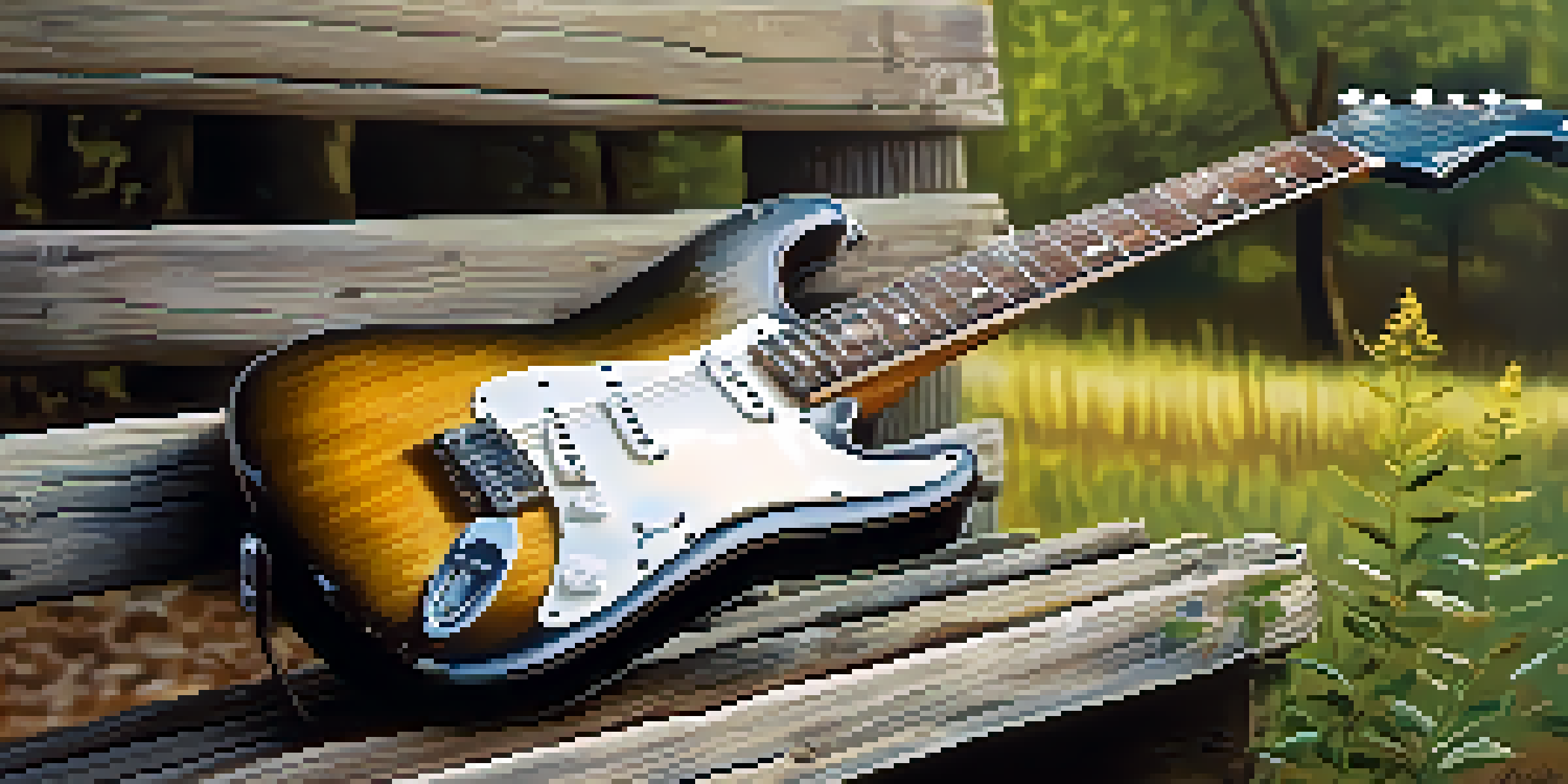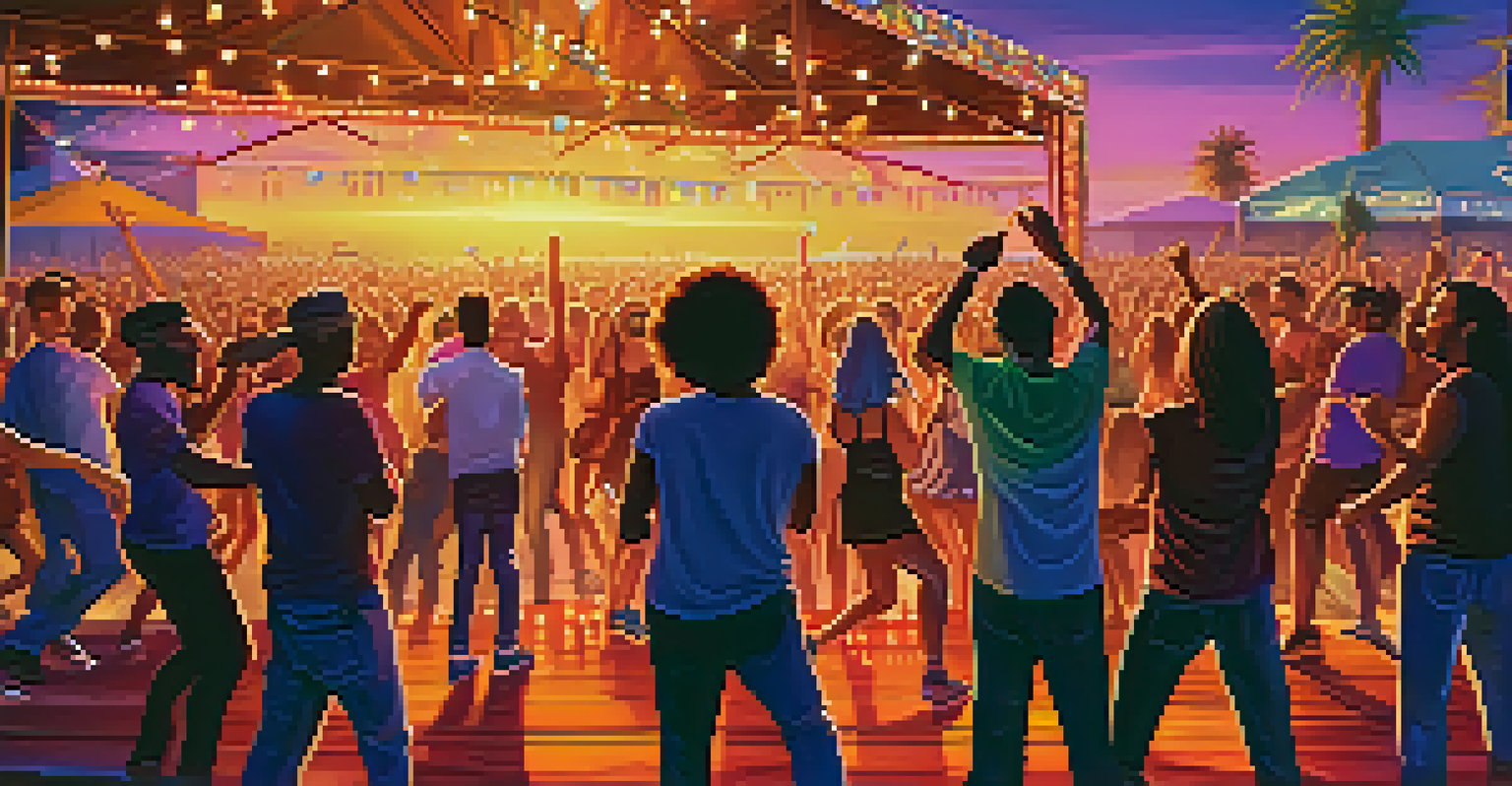Guitar Legends and Their Impact on Political Activism

The Electric Guitar: A Tool for Social Change
The electric guitar has long been more than just a musical instrument; it has served as a powerful symbol of social change. From rock and roll to folk music, guitarists have wielded their instruments to amplify voices that often go unheard. This cultural phenomenon showcases how music can resonate beyond entertainment, becoming a rallying cry for political activism.
The duty of youth is to challenge corruption.
For instance, during the civil rights movement, artists like Bob Dylan used their music to shed light on injustices and inspire change. Songs like 'The Times They Are A-Changin'' became anthems for those seeking equality and justice. By strumming their guitars, these legends captured the spirit of a generation ready to challenge the status quo.
Moreover, the guitar's raw energy and emotive power make it an ideal medium for expressing dissent. When artists like Jimi Hendrix played 'The Star-Spangled Banner' at Woodstock, they transformed a patriotic symbol into a critique of the Vietnam War, showcasing how music and activism can intertwine.
Bob Dylan: Voice of a Generation
Bob Dylan stands as a towering figure in the realm of music and political activism. His lyrics often address social issues, making him a voice for the voiceless during tumultuous times. Songs like 'Blowin' in the Wind' and 'The Times They Are A-Changin'' encapsulated the hopes and frustrations of the 1960s counterculture, urging listeners to consider their role in society.

Dylan’s impact transcended music; he became a lyricist whose words inspired action. When he performed at rallies, he didn’t just entertain; he ignited passion and solidarity among crowds. His ability to blend poetic lyricism with compelling melodies made his messages resonate deeply, leading to significant cultural shifts.
Guitar as a Catalyst for Change
The electric guitar has historically been a powerful tool for artists to voice social issues and inspire activism.
In the years since, Dylan's influence continues to be felt, as musicians and activists alike draw inspiration from his work. His legacy reminds us of the power of song to confront societal issues and unite individuals in pursuit of justice.
Jimi Hendrix: Rock and Protest
Jimi Hendrix, often hailed as one of the greatest guitarists of all time, used his art to challenge societal norms. His iconic performance at Woodstock in 1969, where he famously reinterpreted the national anthem, served as a poignant protest against the Vietnam War. His electrifying guitar solos were not just expressions of musical genius but also of deep discontent.
Music can change the world because it can change people.
Hendrix's music and persona embodied the spirit of the 1960s, marked by a desire for freedom and change. Through his innovative sound, he resonated with a generation disillusioned by political strife and social injustice. His ability to merge technical skill with raw emotion made his messages even more powerful.
Beyond his music, Hendrix's impact was felt in cultural movements, as he became a symbol of peace and love during a time of conflict. His legacy continues to inspire musicians and activists, proving that the guitar can be a formidable tool for political expression.
Folk Music: The Soundtrack of Activism
Folk music has historically been intertwined with political activism, serving as a powerful medium for social commentary. Artists like Joan Baez and Pete Seeger used their guitars to address issues such as civil rights and anti-war sentiments. Their songs resonated with audiences looking for hope and change during challenging times.
Baez, often dubbed the 'First Lady of Folk,' not only sang about social issues but also actively participated in protests. Her performances were more than concerts; they were platforms for advocacy, drawing attention to causes that mattered. This duality of artist and activist exemplifies the profound connection between music and social movements.
Legacy of Musical Activism
Icons like Bob Dylan and Jimi Hendrix paved the way for future generations to use music as a platform for social justice.
Similarly, Pete Seeger's contributions to folk music and activism have left an indelible mark. His song 'We Shall Overcome' became an anthem for the civil rights movement, uniting people in their fight for equality. Through the simple strumming of his guitar, he inspired generations to stand up for what they believe in.
The Punk Rock Movement: Rebellion Through Riffs
The punk rock movement emerged in the 1970s as a raw, unfiltered response to political disillusionment, and guitarists were at its forefront. Bands like The Clash and Sex Pistols used their music to critique government corruption and social injustice. Their powerful riffs and rebellious lyrics resonated with a youth disenchanted with the status quo.
Punk rock's simplicity and intensity made it accessible, allowing anyone with a guitar to join the conversation. This democratization of music encouraged a sense of community among those who felt marginalized. The punk ethos of 'DIY' (do it yourself) empowered individuals to express their frustrations and advocate for change.
Moreover, punk rock concerts often served as a breeding ground for activism, uniting fans around common causes. Many bands supported various political movements, using their platforms to raise awareness and mobilize action. The genre's legacy continues to influence artists today, reinforcing the notion that music can be a catalyst for social change.
The Role of Women in Musical Activism
Women have played a crucial role in musical activism, often using their guitars to challenge societal norms and injustices. Artists like Joan Baez, Nina Simone, and more recently, artists like Billie Eilish have harnessed their music to address issues such as gender equality, racial injustice, and mental health. Their voices and guitar riffs have become symbols of empowerment.
Joan Baez, often associated with the folk music movement, not only used her music to advocate for civil rights but also took a stand against the Vietnam War. Her performances inspired countless individuals to join her in the fight for justice. Similarly, Nina Simone’s powerful songs addressed racial inequalities, making her a fierce advocate for the civil rights movement.
Women Empowering Through Music
Female artists have played a crucial role in activism, addressing issues such as gender equality and mental health through their music.
In today's landscape, artists like Billie Eilish continue this legacy, using their platforms to talk about mental health and climate change. Their music reflects a new generation's concerns, proving that the guitar remains a relevant tool for activism. This ongoing trend highlights the importance of diverse voices in shaping social movements.
Guitarists Bridging Generations: A Lasting Legacy
As we look at the impact of guitar legends, it becomes clear that their influence transcends generations. Modern artists often cite classic musicians as inspirations, carrying forward the torch of activism through their music. This continuity reinforces the idea that the guitar can be a powerful vehicle for social change.
For instance, contemporary artists like Bruce Springsteen and Taylor Swift have adopted the mantle of social commentators, addressing issues like income inequality and LGBTQ+ rights through their lyrics. By integrating personal narratives with broader societal themes, they connect with audiences on a deep emotional level, encouraging listeners to engage with these important issues.

Ultimately, the legacy of guitar legends is not just found in their music but in their ability to inspire action. Their stories serve as reminders that music can unite us, challenge injustices, and foster a sense of community. As long as there are guitarists willing to speak out, the tradition of musical activism will endure.
Conclusion: The Power of Music and Activism
In conclusion, the intersection of guitar legends and political activism highlights the profound impact music can have on society. From folk to punk, the guitar has served as a tool for change, inspiring movements and shaping cultural landscapes. These musicians have shown us that their craft extends beyond mere entertainment; it can be a powerful catalyst for social justice.
The stories of artists like Bob Dylan, Jimi Hendrix, and Joan Baez remind us that music has the ability to bring people together, amplify voices, and challenge injustices. Their legacies continue to inspire new generations of musicians and activists to use their platforms for meaningful change.
As we move forward, let us remember that the strum of a guitar can resonate far beyond the stage, carrying messages of hope and resistance. The power of music in activism is timeless, and its potential to effect change remains as strong as ever.